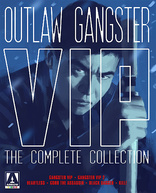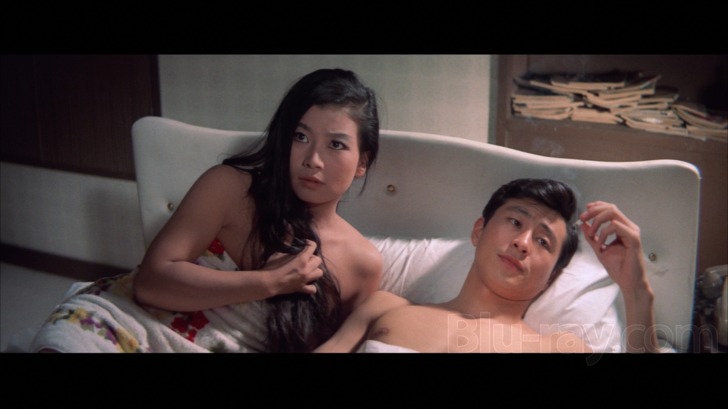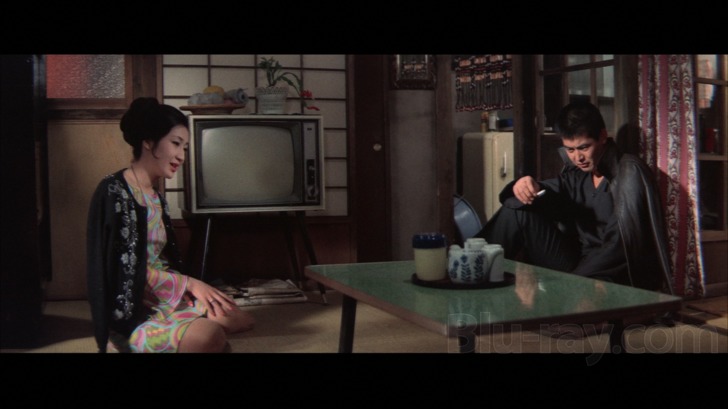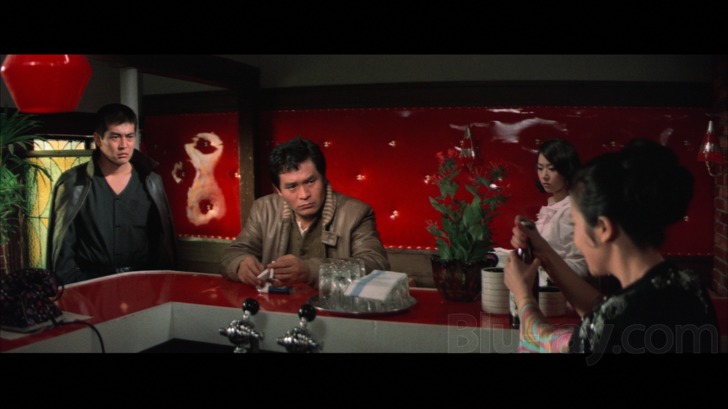Black Dagger Blu-ray Movie
HomeBlack Dagger Blu-ray Movie 
Blu-ray + DVDArrow | 1968 | 86 min | Not rated | No Release Date

Price
Movie rating
7.1 | / 10 |
Blu-ray rating
| Users | 0.0 | |
| Reviewer | 3.0 | |
| Overall | 3.0 |
Overview
Black Dagger (1968)
A street war breaks loose between two rival gangs in the Kansai region of Japan. Goro (Tetsuya Watari) is caught in the middle of the action.
Starring: Tetsuya Watari, Chieko Matsubara, Ichirô Sugai, Kunie Tanaka, Kaku TakashinaDirector: Keiichi Ozawa
| Foreign | 100% |
| Crime | 23% |
| Action | Insignificant |
Specifications
Video
Video codec: MPEG-4 AVC
Video resolution: 1080p
Aspect ratio: 2.44:1
Original aspect ratio: 2.35:1
Audio
Japanese: LPCM Mono
Subtitles
English
Discs
50GB Blu-ray Disc
Two-disc set (1 BD, 1 DVD)
DVD copy
Playback
Region A (B, C untested)
Review
Rating summary
| Movie | 3.0 | |
| Video | 3.0 | |
| Audio | 3.0 | |
| Extras | 1.0 | |
| Overall | 3.0 |
Black Dagger Blu-ray Movie Review
Reviewed by Jeffrey Kauffman April 24, 2016Note: This film is currently available as part of the Outlaw: Gangster VIP Collection.
It’s certainly not a scientific survey by any stretch of the imagination, but when I quizzed a coterie of Japanese film fan friends of mine to
name a
Japanese film studio, absolutely no one came up with Nikkatsu. Toho was quite popular, as was Toie, but Japan’s oldest studio didn’t even
rate one single, solitary mention. Nikkatsu’s rather redolent history goes all the way back to 1912, easily eclipsing Toho’s genesis circa 1932
or Toie’s origination a few years later in 1938. For whatever reason, though, Nikkatsu, despite its status as the “dean” of Japanese movie
studios, doesn’t seem to have the same general notoriety that some of its competitors do. Nikkatsu may be best remembered by at least
some fans for its so-called “pink film” era, a kind of quasi-soft porn (sometimes maybe a little “harder” than merely soft) approach that
helped the studio weather the roiling 1970s era, when big studios, no matter where they might be located, were facing a rapidly changing
set of demographics and an often frustrating and potentially life threatening new set of economic challenges. One of Nikkatsu’s pre-pink era
calling cards was a short-lived but temporarily almost insanely popular franchise which began with 1968’s Gangster VIP, which is also
known by the slightly different title Outlaw: Gangster VIP. As Jasper Sharp mentions on his commentary for the first film of this new
six film set, the kind of ironic thing about this series coming out of Nikkatsu is that Toie had already staked a claim of sorts on the Japanese
gangster film idiom, kind of like Warner Brothers did in the United States back in the 1930s. The Outlaw: Gangster VIP series wasn’t
very long lived, lasting only around two years from 1968-1969, but it’s a really interesting aggregation of films that should appeal to lovers of
yakuza fare or even those who simply like to ferret out largely unseen entries that have been hidden in the various nooks and crannies of
Japanese cultdom for decades.

Black Dagger moves the story into circa 1962, but the more things change, the more they stay the same. By this point in the franchise’s brief life, the story ruts were fairly deep, but it’s to the credit of the series’ creative team that at least a few interesting angles were still being explored. Once again as in some previous installments the film opens with a brutal knife fight, echoing the seeming inability of Goro Fujikawa (Tetsuya Watari) to ever get very far from violence. This time he seems to be the special target of a character named Sueo (unfortunately the IMDb provided no aid in deciphering the actor playing the role), the son of the local mob kingpin who runs the Buso yakuza gang. In a moment that probably shocked 1968 filmgoers, as Sueo and Goro go at it with blades blazing, Yuri (Chieko Matsubara) gets stabbed by mistake and is killed. What? A Gangster VIP film without a love pairing between Watari and Matsubara? Heaven forfend? Well, don't be too shocked, because it turns out there are a lot of women hanging around who seem to bear a rather remarkable resemblance to Matsubara, even though their names may have been changed to protect the overly coincidental.
Once again Goro is attempting to go (more or less) straight, despite his penchant for slicing and dicing yakuza who stumble into view. This time he goes to work for an old buddy of his who runs a gravel company. When the boss offers to buy Goro a drink at a local watering hole, Goro is shocked to find the bartender is none other than his old love Saeko. That leads to a bit of a misunderstanding with her husband, though once he’s brought up to speed that the guy sharing tea with his wife is Goro the Assassin, he’s at least a little less inclined to make a big deal out of it, especially since he’s also a yakuza and one who could use a bit of help (which Goro politely declines to offer).
An accident at the gravel factory sends Goro to the hospital, where he meets a lovely young nurse named Shizuko, who just so happens to be played by a certain actress who has heretofore (mostly) played roles starting with the letter “Y” (who says innovation is dead?). Shizuko is identified right off the bat as a sensible woman who hates yakuza, but she has caught the eye not just of Goro but also of Sueo.
Black Dagger is fairly rote at times, but it’s brisk and well plotted, and has the requisite well staged action sequences. Once again finger injuries are rife—this times it’s an entire yakuza clan that is missing digits, with an evidently unending supply of bandages at their beck and call.
Black Dagger Blu-ray Movie, Video Quality 

Goro the Assassin is presented on Blu-ray courtesy of Arrow Films with an AVC encoded 1080p transfer in 2.44:1. All six films in the
Outlaw
Gangster VIP franchise share some common characteristics, and so I will be offering some general assessments that pertain to the series
as a whole before moving on to more specific comments about this particular film. Arrow's brief comments on the provenance of the elements
utilized for these transfers mentions only that "The Outlaw Gangster VIP series was transferred from original preservation film
elements
by Nikkatsu Studios in Japan. All six films were delivered to Arrow Films as remastered files." This unfortunately doesn't really provide a lot of
information, and it's my assumption that at least some of these may have been transferred from secondary sources like prints rather than IPs
or
negatives. Several of the films have recurrent brightness and contrast fluctuations which are quite noticeable and create a kind of slow motion
quasi-flicker, with clear gradations in tones especially visible in darker moments. While elements show various signs of wear and tear, and
feature slight fading which tends to skew flesh tones toward the brown side of things, palettes are overall quite convincing and robust,
especially
when it comes to aspects like the bright red blood that flows so ubiquitously in each of the entries.
Black Dagger has a few odd anomalies, including some recurrent white horizontal lines that intrude (one noticeable moment is at circa
2:03) that almost resemble old VHS tracking problems or even some electronic anomaly that may have entered the fray at some point. As with
other films in the series, there are
still some noticeable brightness and contrast fluctuations.
As I mentioned with regard to Goro the Assassin,
while there's anamorphic squeeze more than noticeable in this presentation, in this case it's vertical and limited to the
very
edges of the frame, in what I might term "CinemaScope" syndrome. (Technical information on this series is maddeningly hard to come by, but I
have to assume at least this film was shot in some anamorphic technique that would create such an anomaly.) Look for example at the big
yakuza gathering in the dojo (or wherever it is that yakuza congregate), and the squeezing of the members at the edge of the frame
is
unmistakable (see screenshot 6).
Black Dagger Blu-ray Movie, Audio Quality 

All six films in this set feature uncompressed LPCM Mono tracks in the original Japanese. None of the films is going to set audiophiles' hearts on fire, but with occasional exceptions (Black Dagger being the most noticeable one), there are few real problems with distortion or other age related issues. The films' dialogue and effects are typically rendered with decent force and fidelity, and the fun scores also sound decent, if narrow. Black Dagger receives the lowest audio score of any film in this set due to some distortion that's evident, most noticeably when music is playing.
Black Dagger Blu-ray Movie, Special Features and Extras 

- Trailer (1080p; 2:59)
- Gallery (1080p)
Black Dagger Blu-ray Movie, Overall Score and Recommendation 

It's evident at this point in the franchise's unfolding that the writers were becoming increasingly hard pressed to do anything new with Goro's story, though at least they let Matsubara "stretch" by playing a character whose name starts with "S" rather than "Y" (though she does that, too, if only for a moment). This is probably the weakest of the six in terms of overall technical merits.
Similar titles
Similar titles you might also like
(Still not reliable for this title)

Kill!
1969

Gangster VIP
1968

Gangster VIP 2
1968

Goro the Assassin
1968

Heartless
1968

Hiroshima Death Match
Battles Without Honor and Humanity - Deadly Fight in Hiroshima
1973

Massacre Gun
Minagoroshi no kenjû
1967

Battles Without Honor and Humanity
1973

Proxy War
Battles Without Honor and Humanity
1973

Dead or Alive 2
2000

Stray Cat Rock: Delinquent Girl Boss
1970

Street Mobster
現代やくざ 人斬り与太 / Gendai yakuza: hito-kiri yota
1972

Doberman Cop
ドーベルマン刑事 / Doberuman deka
1977

New Battles Without Honor and Humanity: The Boss' Head
新仁義なき戦い 組長の首 / Shin jingi naki tatakai: Kumicho no kubi
1975

New Battles Without Honor and Humanity: Last Days of the Boss
新仁義なき戦い 組長最後の日 / Shin jingi naki tatakai: Kumicho saigo no hi
1976

New Battles Without Honor and Humanity
新仁義なき戦い / Shin jingi naki tatakai
1974

Detective Bureau 2-3: Go to Hell, Bastards!
探偵事務所23 くたばれ悪党ども / Kutabare akutô-domo - Tantei jimusho 23
1963

The Rambling Guitarist
ギターを持った渡り鳥 / Guitar wo Motta Wataridori
1959

Red Pier
赤い波止場 / Akai hatoba
1958

Eight Hours of Terror
8時間の恐怖 / Hachijikan no kyôfu
1957